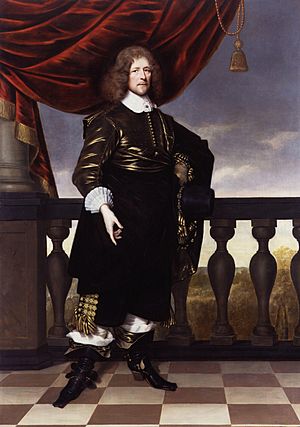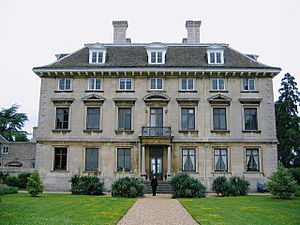Oliver St John facts for kids
Quick facts for kids
Oliver St John
|
|
|---|---|

Portrait by Pieter Nason
|
|
| Chief Justice of the Common Pleas | |
| In office 1648–1660 |
|
| Preceded by | John Bankes |
| Succeeded by | Sir Orlando Bridgeman, 1st Bt |
| Solicitor General | |
| In office 1641–1648 |
|
| Preceded by | Edward Herbert |
| Succeeded by | Thomas Gardiner |
| Member of Parliament for Totnes |
|
| In office 1640–1653 Serving with John Maynard
|
|
| Personal details | |
| Born | c. 1598 |
| Died | 1673 |
| Spouses | Johanna Altham, Elizabeth Cromwell |
Sir Oliver St John (born around 1598 – died 31 December 1673) was an important English judge and politician. He was a member of the House of Commons from 1640 to 1653. During the English Civil War, he supported the Parliamentary side against the King.
Contents
Early Life and Education
Oliver St John was the son of Oliver St John of Cayshoe and Sarah Bulkeley. His sister, Elizabeth, moved to America in 1636. Oliver studied at Queens' College, Cambridge in 1616. He later joined Lincoln's Inn in 1619, which is a place where lawyers are trained. He became a lawyer in 1626.
Oliver St John sometimes had disagreements with the King's court. He became friends with future leaders like John Pym and Lord Saye. In 1638, he famously defended John Hampden. Hampden had refused to pay a tax called Ship Money. St John's strong speech made him a well-known lawyer. That same year, he married Elizabeth Cromwell. She was a cousin of Oliver Cromwell, who later became a very powerful leader. This marriage helped St John become close friends with Cromwell.
Political Career and Parliament
In April 1640, Oliver St John was elected to Parliament for Totnes. This Parliament was called the Short Parliament. He was elected again for Totnes in November 1640 for the Long Parliament. He worked closely with Hampden and Pym. They strongly opposed the Ship Money tax.
In 1641, the King made St John the Solicitor General. This was a high legal position, meant to gain his support. However, St John continued to support Parliament. He played a big part in the impeachment of Thomas Wentworth, 1st Earl of Strafford. This was a legal process to remove Strafford from power. Because of his actions, St John was removed from his Solicitor General job in 1643.
When the Civil War began, St John became one of the main leaders for Parliament. In 1647, he sided with the army during a disagreement with Parliament. He remained trusted by Oliver Cromwell throughout this time. St John was known for being a serious and focused person.
Judicial and Other Important Roles
In 1648, St John was made Chief Justice of the Common Pleas. This was a very important judge position. From then on, he focused mostly on his work as a judge. He chose not to be one of the judges for the trial of King Charles I.
In 1651, he traveled to The Hague to try and create a political union between England and the Dutch Republic. This mission did not succeed. However, in the same year, he successfully negotiated a similar union with Scotland. He also became the Chancellor of Cambridge University in 1651. He held this important university role until 1660.
Oliver St John built a grand house called Thorpe Hall in Peterborough between 1653 and 1656. He was also a member of the Council of State from 1659 to 1660. This council helped govern England.
Later Life and Family
After the King returned to power in 1660 (the Restoration), St John tried to keep his job as Chief Justice but was not allowed. He wrote a public explanation of his past actions, which helped him avoid serious punishment. He was simply kept out of public office. He lived in his country house until 1662. After that, he left England and moved to Basel, Switzerland, and later to Augsburg, Germany.
Oliver St John married Johanna Altham first. They had two sons and two daughters. In 1638, he married Elizabeth Cromwell, and they had two children. After she passed away, he married Elizabeth Oxenbridge in 1645. His son Francis also became a Member of Parliament. His daughter Johanna married Sir Walter St John. She was the grandmother of Viscount Bolingbroke, another famous politician.
Oliver St John came from a very old and important family. His family had two main branches: the St Johns of Bletsoe and the St Johns of Lydiard Tregoze. He was a distant cousin of the King through an ancestor named Margaret Beauchamp.
Images for kids
 | James B. Knighten |
 | Azellia White |
 | Willa Brown |




